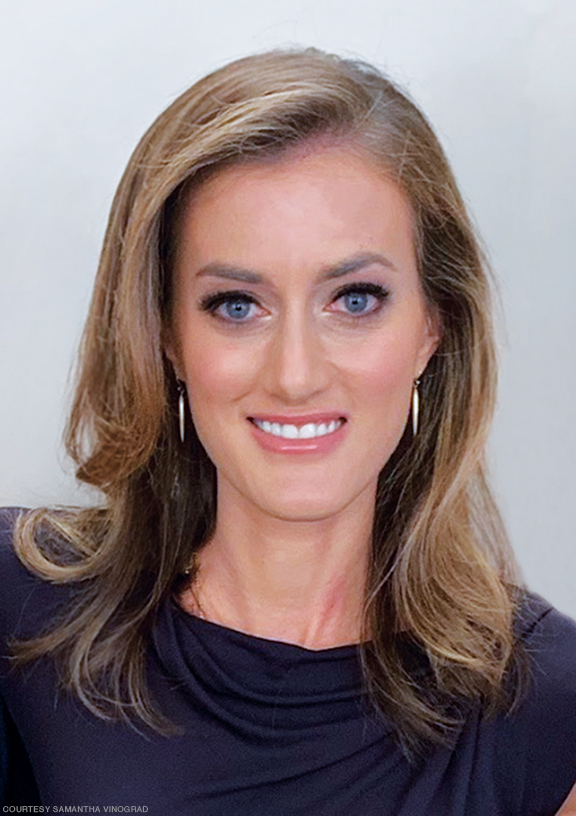
Meet the CNN analyst who makes sense of global uncertainty for her viewers and clients.
Samantha Vinograd C’05 was just two years out of college when she began serving as deputy US treasury attaché to Iraq. It was 2007, President Bush had just ordered 20,000 additional troops to Baghdad, and the 24-year-old suddenly found herself in the middle of the fray.
“I thought it was all really exciting at the time,” Vinograd says. “But it also got really scary at other times. They didn’t have a great support system for civilians, both in terms of preparing you before you go as well as dealing with everything associated with losing friends and getting rocketed multiple times a day.”
As daunting as that experience was, it launched Vinograd’s entire career.
From 2009 to 2013, she served on President Obama’s National Security Council as the director for Iraq, director for international economics, and senior advisor to the national security advisor.
Most recently, Vinograd has been a national security analyst for CNN, offering what she calls “glimpses of the kind of intelligence assessments that are likely to come across the desk of the President of the United States.” In her TV appearances and online columns, Vinograd dissects the typical threats from well-known American adversaries, as well as some that might not be as apparent to those without the relevant expertise—like the ramifications of the COVID-19 pandemic crisis for national security.
In a mid-April column for cnn.com, Vinograd noted that while the US government has been scrambling to protect its personnel from the pandemic, there is no “pause button” for threats posed by Russia, China, North Korea, and others. So while restricting the number of people who physically show up to work may reduce health risks, it also means that national security personnel don’t have the same access to classified information because, for the most part, they can’t receive classified content at home.
To prepare for her analyses, Vinograd sticks to a daily routine of consuming information from a broad range of trusted sources—from journalists to politicians to various think tanks. “I’m also paying close attention to what’s happening with the presidential race,” she says, “while at the same time keeping in mind that there’s a whole world out there during this coronavirus outbreak.
“So my weekly segment for CNN has also included Afghanistan, Iraq, Iran, and North Korea—because even though coronavirus is super-important, it’s not the only thing shaping the world right now.”
Vinograd’s interest in global issues goes back to her first year in college. She was in the middle of her Penn orientation when the September 11 attacks happened. “I immediately decided I wanted to study the Middle East after that,” she says. “And Penn is really the reason I am where I am today.”
Most of her studies focused on “historical and religious” aspects of the Middle East, but the “Penn community really supported me in trying to learn more about current events.”
After graduating with a degree in Asian and Middle Eastern Studies, she got her master’s in Security Studies from Georgetown while interning at the US State Department. From there, she was recruited to work at the Treasury Department, which landed her in Iraq.
Vinograd later worked with Goldman Sachs on building public-private sector partnerships across a broad range of policy and business issues, and at Stripe, a tech company in the payment processor industry, where she led global public policy.
In 2018, Vinograd cofounded Global Opportunity (GO) Advisors to provide consulting services on geopolitical risk, policy, and regulatory changes for corporations and other organizations.
She started GO Advisors with her best friend, Morgan Ortagus, who is currently serving in the Trump administration as spokesperson for the State Department.
“Morgan and I met in Baghdad in 2007,” Vinograd says. “She’s a Republican, I’m a Democrat, and the goal was to bring a bipartisan lens to the issues—everything from election security to trying to make sense of national security events that factor into business planning.”
GO Advisors remains a work in progress, though, because most of Vinograd’s time is spent preparing for her weekly CNN segments, while her business partner is consumed with her duties in the State Department.
“One of the things I miss about having my best friend in the administration,” Vinograd says, “is that I don’t get to hear the more right-of-center views on particular issues from her.”
What little free time Vinograd does have is mostly devoted to social impact work with a focus on children. As a Jewish kid in France during World War II, her father survived the Holocaust, “and as I thought about what issues matter to me, I was just really drawn to child refugee issues.”
Currently she’s an advisor to the Next Generation board of the US Holocaust Museum, a board member for the Paradise Fund (a disaster relief organization), and an advisor for Friends of the American University of Afghanistan, World of Children, Concordia Summit, and UNICEF.
Vinograd finds that now that she has a much bigger platform, sharing information and getting people to pay attention to a cause is a great way to help the organizations she supports.
Yet of all of the things Vinograd has accomplished, she’s most proud of her work in government. And she’s “deeply hopeful that I will be back in government sooner rather than later—hopefully in 2021.
“But,” she adds, “I just do what I love, and it has always led somewhere really interesting.”
—Steve Neumann

